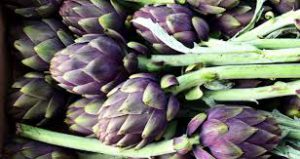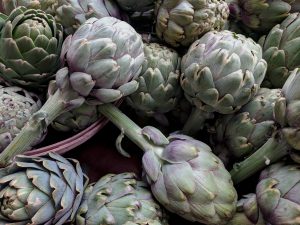Learn how to Plant, Grow and Care for Artichokes

Artichokes is a wild perennial which is a favorite of millions worldwide, that contributes to our health in great ways. Artichokes contain many vitamins. This vegetable is a good source of antioxidants that help our bodies to get rid of free radicals which can work against our health.
Make your bathroom trip easier by including artichokes in your diet. Artichokes are rich in fibre so become a friend of artichokes and load up on those fibres.
Promote your liver health by adding artichokes to your dinner plate. Our liver is an important organ that helps to filter our bodies keeping it clean so keep your liver healthy and functioning with the help of artichokes.
What other ways do artichokes benefit us?
1. Artichokes promote heart health.
2. Help to improve brain function.
3. Reduces the level of bad cholesterol.
4. Promotes digestive health.
5. Artichokes are good for your skin.
6. Do you want healthy hair then give artichokes a try, you will be glad that you did?
How to grow artichokes
Choice of location
When it comes to choice of location chose an area that gets full to partial sun.
Soil type
The soil type should be fertile. Loam or sandy soil is also good. Ensure that the soil is a well-drain soil, adding compost will work wonders giving you the best results ever for your artichokes.
How to water your artichokes
Artichokes are heavy drinkers so give your artichokes a good drink.
Fertilizer
When fertilizing your artichokes use an organic fertilizer or chicken manure. Use dry manure because fresh manure will burn your plant’s root, artichokes are heavy feeders.
Growing artichokes in containers
When growing artichokes from containers choose a large container because artichokes need plenty of room to grow. The container that is chosen can be anywhere from 7-gallon and larger.
Although artichokes are heavy drinkers ensure that container has holes to allow excess water to drain on through.
Follow the above producers when it comes to soil type, fertilizing, and watering.
Insect pest of artichokes

- Leafhoppers
- Cutworms
- Slugs
- Aphids
- Snails
- Thrips
- Mites
As a gardener whether full-time or maybe just as a hobby, there will come times when you will have to deal with many garden insect pest that seeks to make a meal out of our plants whether fruits, vegetables, herbs, ornamental plants et… The good news is we can counterattack which will give our garden plants a chance to grow healthy ensuring that we get a good harvest.
When it comes to artichokes these are the pests to watch out for. Slugs and snails. Slugs and snails can cause a lot of damage by eating parts of our plants which is not only not bad for our plant’s health but can really have our garden plants looking unattractive. Slugs and snails can be controlled by handpicking or using slug traps.
Aphids, thrips, mites, leafhoppers, cutworms can be controlled by applying insecticidal soap sprays, horticultural or neem oil. If aphids are present only, then spraying your artichokes with a strong spray of water will knock them off and eliminate them.
Diseases of artichokes
Disease of artichokes that are very damaging to artichokes is powdery mildew which is caused by fungi that appear as a white coating on the foliage or leaves. This disease is brought on and thrives in weather that is warm and moist.
Botrytis blight thrives in weathers that are moist and cool. This disease is caused by fungi. The crown of garden plants that are infected has a foul smell and is slimy. You may also see molds that are fuzzy and grey to white.
To manage this disease plant in soils that are fertile, light and well-drawn. Keep plant bed clean of debris, water plants at the base, try to avoid wetting the plant’s leaves, give plant proper spacing for air circulation.
How to grow artichokes
Harvest time
Now comes the good part and that is harvest time. The buds of artichokes are ready to harvest once they reach full size just before the bracts open. Artichokes can be harvested in late July or early August.
When removing buds cut off three inches of the stem. Once harvest time is over continue to feed and water your artichokes.
Storage
Storage time is critical for artichokes in order for them to maintain their freshness. Artichokes can be stored up to one or two weeks in the refrigerator. The buds of artichokes should be kept in perforated plastic bags and placed in the vegetable crisper section.
The final word
Artichokes are so beneficial and what is so great is you can grow these wild perennial from the comfort and privacy of your home garden so go ahead and make artichokes a part of your garden.
Growing artichokes is so easy. Just follow the steps in this post that have been provided and you will be on your way to artichoke success.
About the author
Norman loves being in the garden, both at home and for his job....
he is 'Natures Little helper' being outdoors, growing his vegetables and flowers from an early age.
Now having spent over 22 years in the profession he want to give some of his knowledge to others...
his vast array of hints and tips you will find scattered over this site will help you no end growing plants in your garden.
